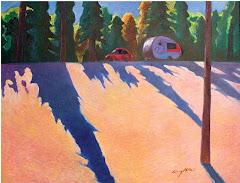
My mother was born in Sioux Falls and I decided to do a little poking around in the family tree while in South Dakota. The highways are laid out like a checkerboard here mostly heading north & south, or east & west. I drove straight north past miles of flooded fields dotted with occasional farmhouses to Aberdeen in NE South Dakota.
Mother has memories of Grandpa John Thomas Bell living here as a successful businessman. His daughter, Cora Bell, 6 months, is listed in the US census of 1880. She was married to Robert Bigford Gage, b. 1879 for only a year, and then Mr. Gage 'disappears' from our story. Their son, Kenneth Homer Gage, b. 17 July 1899, my grandfather, was raised by his grandfather. Kenneth went to work one summer around 1919 in Mr. Bell's dry cleaning(?) business in Sioux Falls where one day he saw young Nellie Langstraat, my grandmother and married her. They might have stayed in Sioux Falls except that Kenneth learned about opportunities in California. The Anza desert was being homesteaded. He moved his wife and baby (mother) in the early 1920s to the west, and Cora came out to live in Anza on a homestead complete with windmill & well. I remember my great grandma Cora as we visited her there when I was small in the 1950s.
I imagine if our family story had gone differently, I might be a citizen of South Dakota instead of California. I've been impressed with the people and the wide open spaces here. The kids are polite and the people hospitable. There are plenty of computers in the library, but the rule is still 'quiet', a good thing as I compose this chapter.
Our traveling group has been in Pierre, the capital, for a few days; the local paper did an article on us! This is where Lewis & Clark had a showdown with the Sioux. The chiefs didn't like the gifts they were offered, and wanted guns instead; they were the most antagonistic of all the tribes encountered. It turned out to be the beginning of the end for the Sioux culture which withered in the next 75 years.
I am looking forward to the next leg of the journey, Bismarck, North Dakota, and the Mandan village where the Corps of Discovery spent the winter of 1804-1805. Adieu for now!



I find myself rooting for the Native Americans throughout your journey -- seeing the Lewis and Clark adventure as the beginning of the end for the Natives. Perhaps Plymouth Rock really was the beginning of the end. I was surprised to see that Lewis and Clark took off in 1802 (was it??). Not that long ago. Only 208 years to create the world we have (no comment on that...). Since I know of relatives who live into their 90s+, that's only two full lifetimes away minus about half of mine.
ReplyDeleteCorrection ... 2 full lifetimes plus half of mine!
ReplyDelete